Perfectly perfect perfection...not!
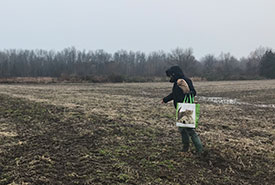
Seeding the field in one of the few not so “slurpy” spots. (Photo by NCC)
Imagine the perfect day in the field. A day where the sky is clear and blue. The sun is warm, but not too warm. A cool breeze wisps across your face, leaving you feeling refreshed and comfortable. The birds are singing, and the butterflies are...
Team work really does make the dream work: A toast to my co-workers
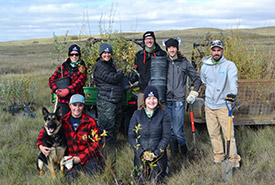
Six staffers and volunteers, 200 shrubs, five hours. Team work really does make the dream work. (Photo by NCC)
I’ve always said that I have the best co-workers, and this fall, they proved my point again. As an engagement manager with the Nature Conservancy of Canada (NCC), I feel like I’m always asking for help at volunteer and engagement...
Celebrating wetland conservation: NAWCA turns 30
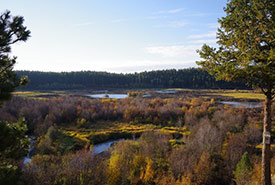
Picturesque Cherry Meadows, BC (Photo by Carol Latter)
This month, the North American Wetlands Conservation Act (NAWCA) turns 30. Passed on December 13, 1989, NAWCA is one of the most successful pieces of conservation legislation in U.S. history. Under the Act, the U.S. Fish and Wildlife Service...
Celebrating our Conservation Volunteers
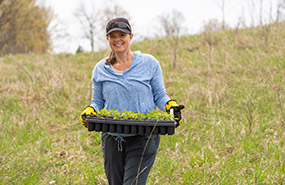
Volunteer with tray of seedlings at Goulding West property, Ontario (Photo by Neil Ever Osborne)
Every December 5, on International Volunteer Day, the United Nations recognizes volunteers worldwide for their efforts and celebrates the impact they are making toward achieving the Sustainable Development Goals —17 global goals set by the...
Conservation on a budget
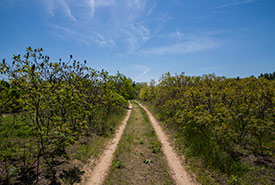
Lake Erie Farms (Photo by NCC)
This spring, conservation staff from the Nature Conservancy of Canada (NCC) contributed to a study that looked at the most cost-efficient ways to monitor restoration success in Ontario. So what, you may ask? Let me back up a bit and provide some...
A glimpse of the past: Using historic maps to guide land management
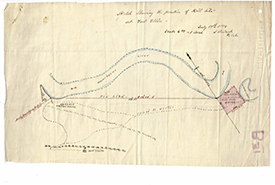
Historic land survey outlining the store house and fort site at NCC’s Fort Ellice property in MB (Photo by Manitoba Archives 2019)
The Prairie provinces, like much of agricultural Canada, look vastly different than they did before European settlement. During the development of Western Canada, forests were cleared, wetlands drained and grasslands plowed in an effort to settle...
Reforestation breathes fresh air into efforts against climate change
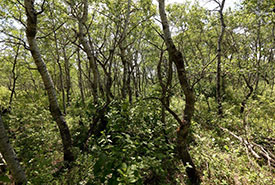
Forests are a vital part of our fight against climate change. (Photo by NCC)
When you think of Saskatchewan, your first thoughts probably go to flat cropland, rolling grasslands, sunsets and open horizons — and not forests. In reality, our prairie province is actually more than 50 per cent forested. In fact, boreal...
Meadows for Monarchs
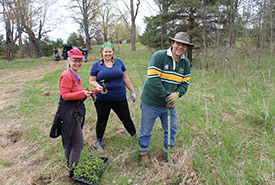
Meadows for Monarchs event participants (Photo by NCC)
If you thought you saw more monarchs flitting about last summer and fall, you were right. Monarch Watch reported that 2018 was a good year for the iconic orange and black butterfly, thanks to a combination of aggressive conservation efforts in...
Connecting to the land through conservation
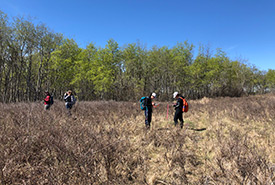
We spent the morning walking NCC’s Ursulan property. (Photo by NCC)
On my first field day with the Nature Conservancy of Canada (NCC), I was expecting a rigorous day of mapping, tracking and other GPS functions I don’t understand. Instead, I found myself birdwatching my way around a beautiful piece of NCC...
Bossing the burn: Part two
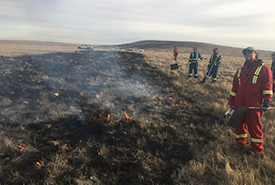
Morgan Kanak, Emily Little, Michael Burak, Dale Gross and Gabriel Foley admiring the black line we established using the tools of the trade, including flappers and a drip torch. (Photo by NCC)
This is part two of “Bossing the burn.” Click here to read part one. Have you heard the Tragically Hip song, “Lonely End of the Rink”? I’m pretty sure it is a love song that also describes the toughest position in...

